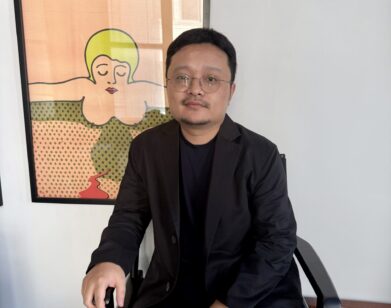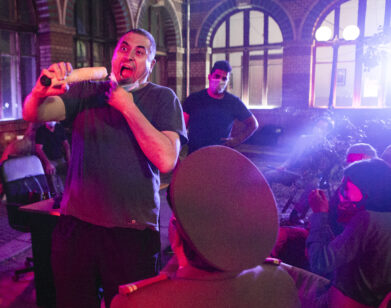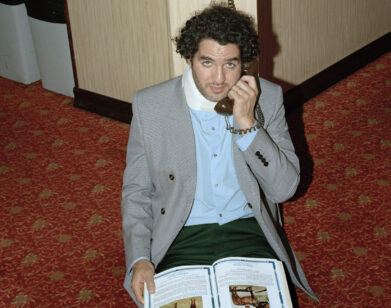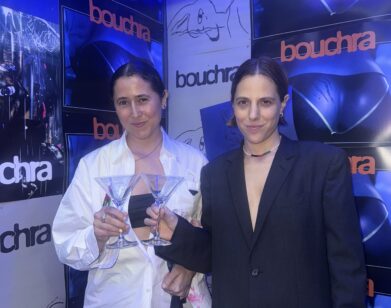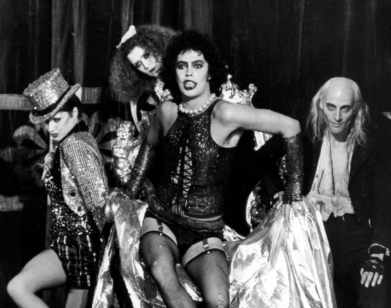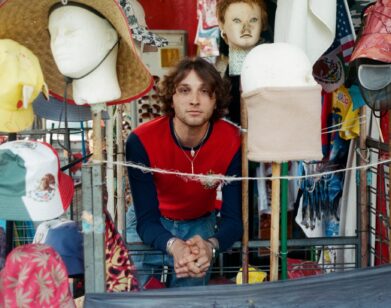Blank City: Excavating the Underground
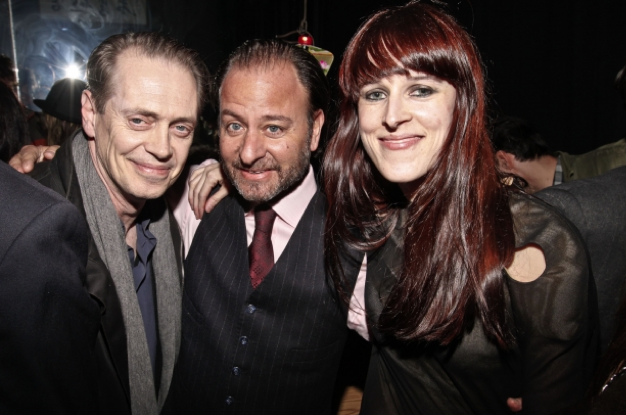
STEVE BUSCEMI, FISHER STEVENS, AND CÉLINE DANHIER AT THE BLANK CITY PREMIERE. PHOTO COURTESY OF ILIR BAJRAKTARI/PATRICKMCMULLAN.COM
The director is sprawled out on the floor of the IFC Center on her hands and knees with the producer. The producer has her shoes off, and the two of them are signing copies of the poster for their film Blank City. These signed posters will become gifts and prizes for the many people who helped the film, which features Jim Jarmusch, Debbie Harry, Steve Buscemi, John Lurie, Fab 5 Freddy, Thurston Moore, Richard Kern, Lydia Lunch, Amos Poe, and Eric Mitchell talking about their experiences in New York’s No Wave film scene. Downstairs, there is a Q&A and screening of the very charming Bill Cunningham New York, about the octogenarian street style and society photographer for The New York Times. But upstairs, French-born Céline Danhier and her crew have created a very beautiful document of a very different New York, spanning the same time period. In it, you see the convergence of uptown, downtown, punk, hip-hop and honest-to-God street style. From the ’70s to the ’80s, a group of young and happily inexperienced filmmakers chronicled life in New York. Sometimes the actors were friends; sometimes they were Debbie Harry or Fab 5 Freddy or Steve Buscemi trying to be actors. At heart, the films were a collaborative process among friends.
When we asked first-time director Céline Danhier to sit down with us to talk about the film, she wanted to make sure that co-producer Sabine Rogers and editor Vanessa Roworth were in on the conversation. The film’s run at IFC has since been extended an extra week.
BRENDAN SULLIVAN: Jim Jarmusch spends the whole film answering your questions about his beginnings as filmmakers and then he says, “Forget about the past. Let’s bring on the future.” I love that.
CÉLINE DANHIER: We didn’t want to make a nostalgic film. The New York in this film was the New York we all grew up hearing about. It was dangerous and different. But it was not better. Just different. These filmmakers didn’t know exactly what they were doing, and we started this with the same naïve attitude.
VANESSA ROWORTH: When we started to make this film, none of us were really what you would call filmmakers. Sabine worked for magazines, Céline was in fashion. We had day jobs. But we were like the filmmakers in the story. We were passionate and young, and every weekend was a scramble.
SULLIVAN: One of the great interviews of the film is Steve Buscemi. He was a firefighter in Little Italy at the time. But he was so passionate about film. Even now, he could name every player and director and writer in these hundreds of No Wave films. But at the time he’d bring his whole squad to these film screenings for these roles that he had.
DANHIER: We’d get someone to agree to an interview and they’d say, “What time fits into your schedule?” And it would be like, “Oh, uh… It’s going to be tight, can you possibly do it on the weekend?”
SULLIVAN: It’s not like these films are on television. Even if they starred Debbie or Freddy, people hadn’t seen them other than a handful of releases on small screens, which closed soon after they opened. Most of them were on 8- or 16-millimeter and not many of them made it to VHS, let alone DVD.
DANHIER: When we started, you could still go over to Kim’s Video and rent the bootleg of some of these things. But the research really developed the story. You research this one film you’ve seen and you track down the director and he tells you about this other film or this director or person you should talk to. In that process it really, um… snowglobed?
ROWORTH: She means snowballed.
DANHIER: Yes! Sorry. My English. Plus, we are very tired. Every time the film plays we are out flyering and putting up posters. We’re about to open in 30 cities and I’m like, “How are we going to get posters up in 30 different cities?”
ROWORTH: We have Boston, Austin—all the Landmark Theaters.
SULLIVAN: Who conducted all of these interviews? You never hear an interviewer’s voice.
DANHIER: It was me. And sometimes, because of my accent [Céline is from Paris], I could not… uh… always get my questions answered. Sometimes it was a great thing.
ROWORTH: We were just three girls trying to make a movie in this macho world of filmmaking. Sometimes they thought we were just film students researching a project and so they would open up to us in a way they wouldn’t if we were with a big studio.
DANHIER: I interviewed the artist James Nares, and he has no idea who I am. The interview took a long time, and you don’t always feel like these people want to talk to you. So I asked him, “How did your art develop?” But he didn’t hear me say “art.” With my accent he heard me say “heart.” How did your heart develop? And he had more interesting things to say about that.
ROWORTH: A lot of times you see a documentary come out about a movement or about a certain time, and women are marginalized. Or years later they come out with this revisionist history, where you tell the untold story of the women. But even [Sonic Youth’s] Thurston Moore was the first one to tell us that it was the opposite here. Half the directors we found were women. Thurston remembers being terrified of [actress] Lydia Lunch.
SABINE ROGERS: A lot of these people didn’t think they were part of a movement or they’ve moved on to other careers. Richard Kern is a well-respected photographer. But most of them just did it and didn’t know what they were doing. So were we. And I came on to the project late.
DANHIER: But we were so young and enthusiastic when we started. It didn’t matter.
ROWORTH: When we started, we thought it would maybe be a fun project. I didn’t think it would take even a year.
ROGERS: But then you think, if someone had told this director that this film or that film would become important, would you still have done it? What if they told you no one would care or see it and you’d still be working on it four and a half years later? Would you still do it?
DANHIER: Yes!
BLANK CITY IS CURRENTLY PLAYING AT NEW YORK’S IFC CENTER, AND WILL EXPAND NATIONALLY IN THE COMING WEEKS.

